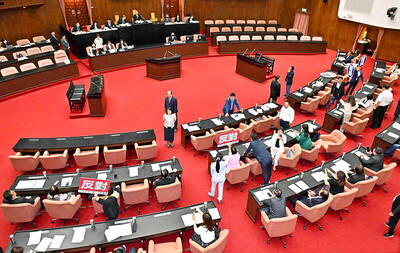Confirming that former president Chen Shui-bian (陳水扁) has been diagnosed with cerebral atrophy, Taipei Veterans General Hospital superintendent Lin Fang-yue (林芳郁) yesterday said it would be better to have caregivers look after Chen at home rather than in the hospital.
However, the Ministry of Justice still has to make an assessment and the final decision, Lin said.
Lin said Chen has been doing well after his hemorrhoid surgery on March 14.
“Chou Yuan-hua (周元華), the attending physician for Chen, has just returned to Taiwan today [Thursday]. We will wait for his medical team to complete and verify the report, which will be submitted to the Ministry of Justice on Friday,” Lin added.
Separately yesterday, a summary report by US-based neurologist Samuel Chou (周烒明) recommended that the best treatment for Chen is immediate home care.
The report follows a brain magnetic resonance imaging (MRI) exam that Samuel Chou, a board member of the ALS & Neuromuscular Research Foundation in San Francisco with more than 40 years of experience in the field of neurology, conducted on Jan. 16 at the request of Kaohsiung Chang Gung Memorial Hospital’s vice superintendent Chen Shun-sheng (陳順勝), a member of Chen’s voluntary civilian medical team.
The Taipei Times obtained an advance copy of the report ahead of its official release today.
The former president, who is serving a 20-year sentence for corruption, has been staying at Taipei Veterans General Hospital for treatment after suffering from various complications, including sleep apnea, severe depression, minor brain damage and suspected Parkinson’s Disease.
Concern over Chen Shui-bian’s human rights was raised in the report, as the former president has been subjected to continuous light exposure and sleep deprivation in prison for years. Samuel Chou said he concurred with Amnesty International Australia’s observation, which described the treatment as “cruel, inhumane and degrading treatment for any person.”
The detrimental treatment is the cause of the neurological abnormalities which “must be considered direct consequences of the prison conditions,” Samuel Chou said in his report, adding that Chen Shui-bian’s current condition has deteriorated in comparison with September last year and could be “irreversible” if no active measures are taken.
The best treatment for Chen Shui-bian is “immediate home care, with supervising medical professionals and management by rehabilitation specialists in a home environment surrounded by family and loved ones,” the report said.
A home environment will be important “in halting further deterioration” and in beginning “the slow and long process towards alleviating the symptoms,” it concluded.
The report found that Chen Shui-bian has been suffering from speech impediment, emotional disturbance, cerebellar defect, poor memory, cognitive disorders or early signs of dementia, among other symptoms.
Joseph Lin, a former professor at the University of California at Davis who began following Chen Shui-bian’s medical condition last year and provided the report, said the summary would be sent to Washington for the reference of a group of US lawmakers who have been monitoring the treatment and health condition of the former president.
The US representatives include Ileana Ros-Lehtinen of Florida and Steve Chabot of Ohio, who met Lin last December and expressed his wish to meet with Chen Shui-bian on his next trip to Taiwan, Lin said, adding that Chabot would like to collect more information and assessments on Chen Shui-bian’s case.
US Representative Robert Andrews of New Jersey has also written a letter to the US Department of State expressing his concern over the prison conditions and medical care for Chen Shui-bian, said Lin, who is visiting Taiwan in a private capacity.
Lin, a Taiwanese-American, led a medical team of US-based experts on a trip to Taiwan in June last year and concluded that the former president’s confinement in prison was “unacceptable” and had affected his physical and mental health. The team later submitted its findings to the Tom Lantos Human Rights Commission.
Additional reporting by staff writer

INSPIRING: Taiwan has been a model in the Asia-Pacific region with its democratic transition, free and fair elections and open society, the vice president-elect said Taiwan can play a leadership role in the Asia-Pacific region, vice president-elect Hsiao Bi-khim (蕭美琴) told a forum in Taipei yesterday, highlighting the nation’s resilience in the face of geopolitical challenges. “Not only can Taiwan help, but Taiwan can lead ... not only can Taiwan play a leadership role, but Taiwan’s leadership is important to the world,” Hsiao told the annual forum hosted by the Center for Asia-Pacific Resilience and Innovation think tank. Hsiao thanked Taiwan’s international friends for their long-term support, citing the example of US President Joe Biden last month signing into law a bill to provide aid to Taiwan,

China’s intrusive and territorial claims in the Indo-Pacific region are “illegal, coercive, aggressive and deceptive,” new US Indo-Pacific Commander Admiral Samuel Paparo said on Friday, adding that he would continue working with allies and partners to keep the area free and open. Paparo made the remarks at a change-of-command ceremony at Joint Base Pearl Harbor-Hickam in Hawaii, where he took over the command from Admiral John Aquilino. “Our world faces a complex problem set in the troubling actions of the People’s Republic of China [PRC] and its rapid buildup of forces. We must be ready to answer the PRC’s increasingly intrusive and

STATE OF THE NATION: The legislature should invite the president to deliver an address every year, the TPP said, adding that Lai should also have to answer legislators’ questions The Chinese Nationalist Party (KMT) yesterday proposed inviting president-elect William Lai (賴清德) to make a historic first state of the nation address at the legislature following his inauguration on May 20. Lai is expected to face many domestic and international challenges, and should clarify his intended policies with the public’s representatives, KMT caucus secretary-general Hung Meng-kai (洪孟楷) said when making the proposal at a meeting of the legislature’s Procedure Committee. The committee voted to add the item to the agenda for Friday, along with another similar proposal put forward by the Taiwan People’s Party (TPP). The invitation is in line with Article 15-2

Premier Chen Chien-jen (陳建仁) and the Ministry of Foreign Affairs yesterday denounced Chinese Nationalist Party (KMT) Legislator Hsu Chiao-hsin (徐巧芯) for making false allegations about donations to Ukraine and disclosing confidential documents, with the ministry saying that it would take legal action. The ministry last year signed an agreement with the Czech Republic on a healthcare project to assist Ukraine, which is to be carried out by the Czech Health Technology Institute. Hsu accused the ministry of being indirectly involved in the party politics of the Czech Republic as institute chairman Petr Foit is a local medical supplier, and has close political